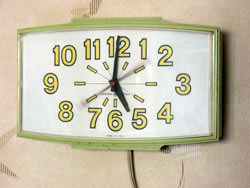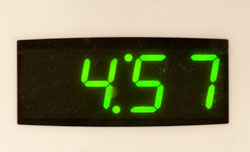Choosing how to spend our time
 ©Janet Allen
©Janet Allen An old-fashioned electric clock, common before life became so busy
One interesting concept is "one planet living," in other words, living with the recognition that we have only one planet and its resources (and currently, we'd need the resources of four planets to live the way we in the US do).
But I'd like to also begin to live with the idea of "one life living," in other words, recognizing that we have only one life—one life to take the time to enjoy flowers and butterflies, to enjoy the company of others, to make a contribution to the world. There's only so much time in anyone's life.
How we choose to spend our time is the most consequential decision in our life, both for ourselves and for the planet.
Treasuring our time
 ©Janet Allen
©Janet Allen We're surrounded by digital clocks - to speed us up?
Shortly after I read Your Money or Your Life by Vicki Robin and Joe Dominguez, I switched first to part-time work and about six months later, quit my job altogether. Shortly after that, I was invited to be on a panel for the Take Back Your Time event at a local college. These events generally take place on October 24—the date that represents the amount of time, from Oct. 24 to the end of the year—that Americans work more than do people in Europe.
"Take Back Your Time" resonated with me. The TBYT organization "challenges the epidemic of overwork, over-scheduling, and time famine that now threatens our health, our families and relationships, our communities, and our environment"—in other words, the things we care about the most.
 ©Janet Allen
©Janet Allen Taking time to smell the roses, but so much more
Certainly not everyone is able to quit their job (and John was still working, so it was easier for me to quit than it would be for many people.) But I can't help but wonder if everyone who is working so many hours a week, especially in two-income households, really needs to.
Of course, some people are doing valuable work that they enjoy, so it's part of their quality of life and a benefit to society. (This has nothing to do with job status: I appreciate people doing a great job in a hospital housekeeping staff, for example, more than, say, some of those rascals working on Wall Street.)
But some people are working just so they can afford one of those big houses filled with luxuries, fancy cars, expensive clothes, pricy restaurant meals, and all the other signs of what passes for success in today's society. I feel sorry for anyone who, at the end of their life, felt that those were the things that made their life worthwhile.
Time and stuff
 ©Janet Allen
©Janet Allen Although this garage mess is long gone, we regret the time wasted dealing with this stuff
One way to have more time is to have less stuff.
Not only do you save the time researching which item of the seemingly thousands of variations available, but you also save time finding a place to store it (which often involves getting more shelving or sorting through old stuff to discard), taking time to maintain it, and ultimately, finding a way to responsibly discard it when it reaches the end of its useful life (or, for many people, when they simply tire of it and want the next "latest and greatest" thing).
